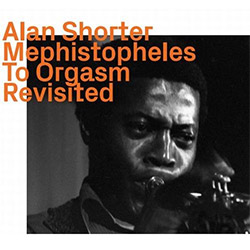
Jazz has always been a family business, both parents and children (sometimes even grandchildren) and siblings and cousins. But fame is — much as is the case in another American gift to the world that is baseball — rarely apportioned equally. With the exception of the Joneses, Heaths, Adderleys and Breckers, there was usually a player in the shadow of his brother.
Trumpeter/flugelhornist Alan Shorter epitomized this phenomenon. In a vacuum he could be seen to have a decent career, with work under Archie Shepp, Marion Brown, Alan Silva and François Tusques and a pair of leader dates, but compared to younger brother Wayne he becomes a shadowy figure, barely talked about these days.
He did appear on one of his brother's albums, the 1965 Blue Note set The All Seeing Eye, but only one one track, his composition "Mephistopheles" (a song he would rerecord with Brown a month later for his eponymous ESP-Disk' album). Three years later Alan suddenly got a major label opportunity with Verve, yielding Orgasm (released in the UK on Polydor as Parabolic). It is a fascinating date, comprising sessions with two different bands: tenor saxophonist Gato Barbieri was part of both but the rhythm section — continuing the theme of disproportionally famous brothers — was either Muhammed Ali (drums) and Charlie Haden (bass) or Rashied Ali (drums) and Reggie Johnson (bass). It should be noted that the latter pair were the rhythm section for the aforementioned Brown date.
Ezz-thetics by Hat Hut, Ltd. Revisited Series now packages "Mephistopheles" with the entirety of Orgasm, with engineering work by Michael Brändli. "Mephistopheles" is essayed by a starry band of the Shorters, James Spaulding (alto), Freddie Hubbard (trumpet), Grachan Moncur III (trombone), Herbie Hancock (piano), Ron Carter (bass) and Joe Chambers (drums) and is one of weirdest songs in the Blue Note catalogue, menacing in its piano vamp and eliciting very different solos than typical of the time from Wayne and Hubbard. It sounds like nothing else in Wayne's catalogue and the only analogue is Andrew Hill's period work for the label.
Alan wrote all six pieces on Orgasm and they feel very much a continuation of "Mephistopheles", demonstrating a penchant for slower tempos and darker feels helped along by the lack of a chordal instrument. In an interesting bit of programming, the two pieces with Haden and Muhammed Ali — also the two longest — open and close the date, the middle four with Johnson and Rashied.
Shorter's playing here presages much of what would now be common among modern-day avant garde trumpeters, usually eschewing any real bop influences or high-note pyrotechnics more common to his era, maybe why real success eluded him. And it would take photo finish to award the garland of flowers to either rhythm section. But the real reason to pick up this set is Barbieri, one of the last times he would fully embrace the role of fire-breather before moving into slicker Latin realms. He was fiscally smart to make the change but one laments the loss of his feistier side.
Shorter died in 1988 at only 55, away from music but apparently writing monumental novels, barely remembered by the jazz audience at large, waiting for the world to get hip to what he had been doing 20 years earlier.
Comments and Feedback:
|



